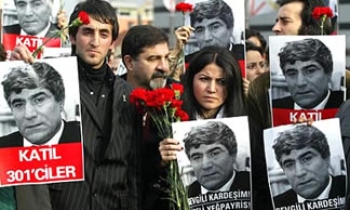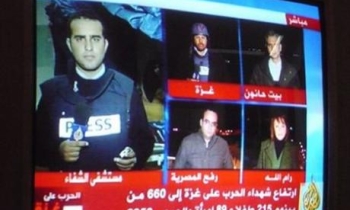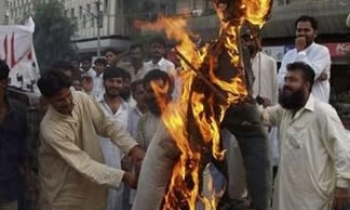A popular Arab television talk show is taking a group of young people to Denmark in an effort to channel Muslim anger over the cartoons of the Prophet Mohammed into more constructive dialogue.
The presenter and producer of Yalla Chabab, a show on the Saudi-backed MBC channel that tries to highlight success stories in the Arab world, are planning to take young Arabs to visit Jyllands-Posten, the newspaper that first published the cartoons in September, and meet the cartoonists.
According to Hani Khoja, the show's producer, the trip, which could take place as early as this week, is expected to generate a series of shows to be aired on MBC.
"Most reaction to the cartoons has been polarising and the circle of protest expanded to become a clash of civilisation," said Mr Khoja. "We felt we'd like to clarify things, to go and talk to people, and ask them 'Do you hate us?' and 'Do you think we hate you?'."
The cartoons, reprinted in several European newspapers, have provoked violent protests in some parts of the Muslim world and more peaceful reactions, including a boycott of Danish products, across the Middle East. The feelings of outrage have been used by some Arab governments to boost their Islamic credentials and exploited by others to stir passions against the west.
Javier Solana, the European Union's foreign policy chief, on Monday began a trip in the region to try to calm tensions. But the ability of government institutions to contain the row may be limited.
In the Saudi coastal city of Jeddah on Monday Mr Solana said he did not think the mocking of the Prophet would be repeated.
"We are going to do our utmost for this not to happen again," he said, after a meeting with the head of the Organisation of the Islamic Conference.
Mr Solana did not say how his expectation could be reconciled with the right to free speech or how newspapers could be convinced not to reprint the cartoons to reassert that right. But he was apparently indicating that the EU could back some form of words against the defamation of religion in the resolution establishing the new UN human rights council, as the OIC has wanted.
Diplomats said Mr Solana, who met King Abdullah of Saudi Arabia in Riyadh later in the day before travelling to Egypt, was passing messages from Denmark to Arab governments.
Some governments, including Saudi Arabia and Egypt, have recalled their ambassadors from Copenhagen over the cartoons. However, in recent days articles have appeared in newspapers calling for dialogue.
Mr Khoja said he believed in the boycott, describing it as a good way to tackle the "self-defeatist attitude Arabs have". But he also said discussing the crisis with Danes would be helpful.
One of the messages his team will take on his trip is that Denmark should hold conferences about the Prophet, in the belief this will prevent cartoonists from mocking him. "They should let the public decide what to think about the Prophet. No one had the awareness to know that doing this about the Prophet is wrong," Mr Khoja said.









